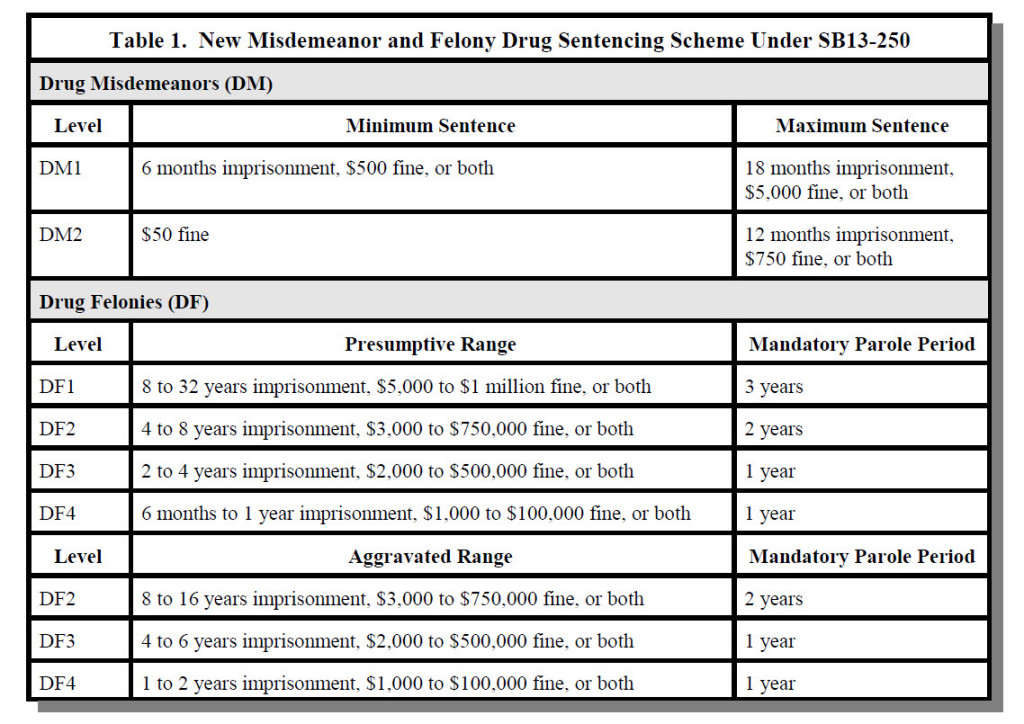




2013 Colorado Law Redesigns Sentencing For Colorado Drug Crimes – Senate Bill 250
by Colorado Drug Crimes Defense Lawyer – H. Michael Steinberg
Sentencing For Colorado Drug Crimes – Senate Bill 13-250 – enacted into law in June of 2013 – will re-focus the prosecution of drug crimes with a new emphasis on treating drug offenders, instead of locking them up with violent criminals.
A Brief History Of Colorado Drug Crimes Laws
In 1985, the Colorado state legislature doubled the maximum penalty across the board for felony crimes. The result was newly sentenced inmates to the Colorado Department of Corrections nearly tripled as a resul. By 1992 – I was already a seasoned prosecutor -when the Colorado Uniform Controlled Substances Act (The UCSA) was passed. At the time – the “war on drugs” was in full force and the Colorado law enhanced Colorado’s drug laws by introducing much higher punishments and mandatory sentencing for certain drug felonies.
Like All Colorado Criminal Law Progressive Reforms – SB-250 has certain policy objectives:
1. The simplification of the current drug sentencing structure;
2. Consistency and transparency in sentencing drug offenders;
3. Better differentiation between drug users/abusers and low, medium and high level dealers;
4. Sentencing options that recognize the individual circumstances of each case;
5. Providing discretion to judges to encourage consideration of a defendant’s criminal history, and allowing for or requiring mandatory or aggravated sentencing for only the most serious drug offenders;
6. The appropriate use of drug courts with priority for funding those that use evidence-based practices;
7. The identification of drug offenders for whom rehabilitation and recidivism reduction are the priority goals of sentencing, and differentiating them from those drug offenders for whom incapacitation and deterrence are the priorities;
8. The development of a scheme that reflects the social value that distribution of drugs to minors is a more serious offense than distribution to adults;
and
9. The goal of increasing confidence among criminal justice participants by persuading them that effective and appropriate treatment services should be provided to offenders
The New Act – Redesigns The UCSA By Instituting Several New Sentencing Options –
The New Sentencing “Grid” Is Printed Below
The Commission presents this proposal for a rewrite of the Controlled Substances Act that includes a separate sentencing framework based on a drug crime classification that has four felony offense levels, two misdemeanor offense levels and petty offenses. (Note: the current petty offense level will continue as in current law and is not addressed here.) Each felony offense level includes both a presumptive and aggravated sentencing range, except for the DF1.
Each felony level also has a corresponding period of parole that would be a mandatory provision of any prison sentence.
SB 13- 250 creates new felony and misdemeanor sentencing levels for specific controlled substance offenses. These new sentencing penalties are outside the “standard” presumptive sentencing scheme.
Drug crime sentencing will now occur within a separate gird that will be outside the standard sentencing for similar level crimes.
Extraordinary Risk Sentencing – No Longer Applies to Colorado Drug Crimes
Extraordinary Risk sentencing enhancements have – in the past before the new law – applied to certain drug offenses such as manufacturing and sales drug offenses. The label “extraordinary risk of harm to society” automatically increases sentences in Colorado’s present presumptive sentencing scheme.
The new law takes a much more rational approach to sentencing for Colorado Drug Crimes. While there are enhancements for the most serious drug offenses – like federal sentencing enhancements – these new sentencing enhancements requires legitimate aggravating factors as sentencing enhancements for drug offenses.
New Sentencing For Simple Possession Of Controlled Substances
In 2010 the Colorado State legislature reduced drug possession penalties in Colorado by redefining the quantity of drugs that is considered “simple possession” from 1 gram or less to 4 grams or less of a schedule I or II drug and 2 grams or less of methamphetamine. Simple possession became a class 6 felony, the lowest felony designation.
The Addition Of The “Wobbler”
SB 13- 250 creates what is traditionally called a “wobbler” statute. While possession of certain controlled substances remain a felony, those convicted of such felony drug possession crimes can later have that conviction changed to a class 1 misdemeanor upon the successful completion of a sentence. The law permits two felonies to be treated in this manner – on the third the felony record cannot be changed.
If a defendant is convicted of an eligible DF4 offense, (see chart) the felony conviction “wobbles” to a misdemeanor upon successful completion of a probation or community corrections sentence. As noted – the “wobbler” is available for the first two convictions (which includes a diversion or a prior dismissed deferred judgement and sentence plea or even a prior “wobbled” case”) of the following DF 4 drug offenses:
1) simple possession when the possession quantity is 4 grams or less of Schedule I/II or 2 grams of meth or heroin,
2) the DF4 Marijuana – hash possession offense,
3) the transfer without remuneration of the small quantities ScheduleI/II
and
4) 18-18- 415 fraud and deceit crimes.
Defendants are eligible for the wobble even if the defendant goes to trial. Exclusions from eligibility are: 1) prior conviction for a Crime of Violence and 2) ineligibility for probation pursuant to 18-1.3-201.
Exhaustion Of Remedies (Treatment)Required Before Prison Can Be Imposed
The new law also creates an “exhaustion of remedies” requirement for certain drug offenders. This requires that the defendant must have already participated in multiple forms of treatment and sentencing before that defendant may be sentenced to prison.
New Rule Impacts The Revocation Of A Drug Based Plea Bargain To A Deferred Judgement and Sentence
Under the former law- if a person violates the terms of a deferred judgment and sentence (Dj and S), the judge is required to enter the guilty plea and impose a sentence. Now if the Dj and S is related to a drug crime, this new law allows – but does not require – a judge to continue the Dj and S and impose new requirements that are designed to help the person complete it successfully
A Summary Of The New 2013 Drug Crimes Sentencing Law
The new law makes a number of changes to current law concerning the sentencing of individuals convicted of drug-related offenses.
It does this by:
• creating new felony and misdemeanor drug sentencing grids
• assigning each existing drug crime a new drug penalty based on the new sentencing grids;
• adding all drug felonies to the habitual sentencing schemes;
• establishing a sentencing option for offenders convicted of certain drug felonies that allows the court to vacate the felony conviction and enter a misdemeanor conviction in its place if the offender successfully completes a community-based sentence (probation or community corrections);
• requiring a judge to exhaust alternative sentencing options for certain level 4 drug felony offenses prior to sentencing an offender to prison;
• requiring a judge to hold a resentencing hearing or make written findings for any level 4 drug felony offender who is terminated from a community corrections program;
• allowing a judge to impose residential drug treatment as a probation condition for drug misdemeanors;
• allowing defendants convicted of misdemeanor drug offenses to be sentenced to intensive supervision probation if appropriate;
and
• prohibiting a plea agreement involving a drug offense from requiring a waiver of the defendant’s right to petition for sealing of his or her criminal conviction records.
Sentencing For Colorado Drug Crimes
Denver Colorado Criminal Defense Lawyer
The Law Offices of H. Michael Steinberg, in Denver, Colorado, provides criminal defense clients with effective, efficient, intelligent and strong legal advocacy. We can educate you and help you navigate the stressful and complex legal process related to your criminal defense issue.
H. Michael Steinberg, is a Denver, Colorado criminal defense lawyer who will provide you with a free initial case consultation to evaluate your legal issues and answer your questions with an honest assessment of your options.
Helping Clients To Make Informed Decisions Colorado Domestic Violence Defense Attorney
H. Michael Steinberg provides solid criminal defenses for clients throughout the Front Range of Colorado as regards….Sentencing For Colorado Drug Crimes.
Other Articles of Interest:
- 2011 Changes to Colorado Drug Crimes Laws: Synthetic Marijuana
- Colorado Criminal Drug Crimes Defense – Sealing Criminal Drug Crimes Arrests and Convictions in Colorado
- Colorado Criminal Drug Laws – Salvia Dinvinorum and Synthetic Cannabinoids – Spice Is Shut Down In Colorado
- A Handbook On Colorado Adult Expungement and Sealing Criminal Record Laws
- Colorado Drug Crimes Sentencing Issues














